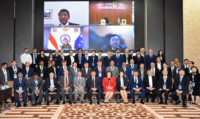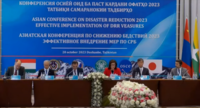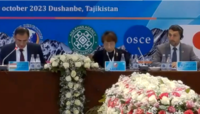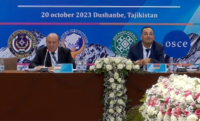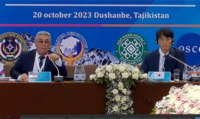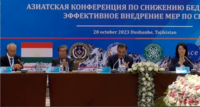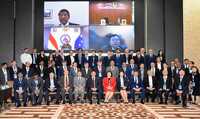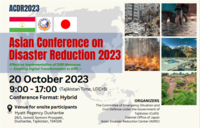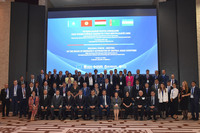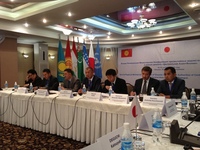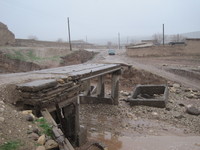Activity Report: Area & Country >> Tajikistan
ADRC participated in the Second Regional Ministerial Conference of Disaster Management Authorities in Central Asia under the "Central Asia plus Japan" Dialogue held in Bishkek, Kyrgyz Republic on 18-19 September 2014. This conference, organized by the government of Japan, the Ministry of Emergency Situations of the Kyrgyz Republic, and UNDP Kyrgyzstan, aimed to discuss the possible creation of a high level forum for disaster management authorities involved in DRR under the "Central Asia plus Japan" Dialogue. The participants included representatives of Kazakhstan, Kyrgyzstan, Tajikistan, Turkmenistan, and Uzbekistan, as well as the Embassy of Japan in the Kyrgyz Republic, JICA, and other international organizations.
During the conference, participants discussed the most urgent DRR issues facing the region as well as future opportunities for cooperation. ADRC presented information on the outcomes of DRR programs conducted in various Central Asian countries, and identified needs and areas for future DRR cooperation in the region.
At the end of the two-day conference, the participants agreed to establish and regularly convene a forum for the heads of the disaster management authorities in Central Asia for discussing efforts to strengthen regional cooperation in reducing, preventing, and responding to disaster risks. In addition, an expert level working group of disaster management authorities in Central Asia will be established to support this forum.
 4-5 June 2014 (Gabala, Azerbaijan)
4-5 June 2014 (Gabala, Azerbaijan)
ADRC has participated in the 7th ECO (Economic Cooperation Organization) International Conference on Disaster Risk Management held in Gabala, Azerbaijan on 4-5 June 2014. This conference was organized by the Ministry of Emergency Situations of Azerbaijan, together with ECO Secretariat. This conference provided the delegates of ECO Member States and experts from UN agencies, international organizations and academic and scientific institutions to discuss and share experiences on disaster risk reduction for better cooperation in the ECO region. In the ECO Member States, Azerbaijan, Iran, Kazakhstan, Kyrgyz Republic, Pakistan, Tajikistan, and Uzbekistan are the ADRC's member countries.
Following the presentations and speeches from the heads of delegations, various organizations such as UNOCHA, UNESCAP, GIZ, Central Asian Institute for Applied Geosciences (CAIAG) and ADPC, etc. introduced their efforts for disaster risk reduction in the region. ADRC made a presentation on its roles in Asia, as well as the programs that member countries from Central and Caucasus can be benefitted, namely the Visiting Researcher Program, the JICA training for Central Asia and Caucasus, and the Peer Review Project.
At the end of the conference, all the participants confirmed that a holistic approach combining policy, operational and scientific levels would contribute to more effective and efficient disaster risk management in the region. ADRC believes that this is crucial not only in this region, but also in other part of Asia.
(2014/06/17 16:50)
24 December - 1 March 2013, TAJIKISTAN
Since 2009, ADRC has initiated a pilot project of DRR Policy Peer Review with the aim of developing DRR capacity of ADRC member countries by sharing information and strengthening the relationship among member countries.
This year, Flood Risk Reduction in Rudaki district of Tajikistan was selected as one of the target projects of the fourth year. After the submission of country report, reviewer team composed of Ph.D. Kenichiro Kobayashi (Associate Professor, Research Center for Urban Safety and Security, Kobe University, Japan), Mr. Prasong Thammapala (Head of Department Operation Center, Department of Disaster Prevention and Mitigation, Thailand) and Mr. Junji Moriwaki (Researcher of ADRC) had visited Tajikistan to conduct interview surveys.
The team visited Main Department of Geology, Institute of Geology Seismic Engineering and other organizations involving in DRR activities to examine how they have been making efforts of developing DRR in Tajikistan. Then, the team conducted inspection of flood vulnerable site as Tajikabad and Ganjina in Rudaki district, and prepared a draft report of the survey result with all findings and recommendations. Also the workshop was held in Dushanbe for getting opinion and comments to finalize the report as well as introducing good practices for reducing flood risk activities in Japan and Thailand. It provided a very good opportunity for exchanging opinions each other.
This project aims at developing the mutual learning process among ADRC member countries instead of one-way learning. After the survey missions, reviewer team will compile survey reports and send them to target countries and then to ADRC member countries to enhance cross-fertilization.
ADRC would like to express its sincerest gratitude to all of those who have made precious contribution to this project.
(2013/2/24 19:40)


Since 2009, ADRC has initiated a pilot project of DR Policy Peer Review with the aim of developing DRR capacity of ADRC member countries by sharing information and strengthening the relationship among member countries. This year Tajikistan was selected as target country for the review project of the third year. After the submission of country report, reviewer team had visited target countries to conduct interview surveys.
The ADRC reviewer team, composed of Prof. Hiroshi Fukuoka (Associate Professor, Research Center on Landslides Disaster Prevention Research Institute, Kyoto University), Dr. Tai-Hoon Kim (Analyst, National Disaster Management Institute, Ministry of Public Administration and Security, Republic of Korea), Mr. R.M.S. Bandara (Head, Landslide Studies & Services Division, National Building Research Organisation, Ministry of Disaster Management, Sri Lanka) and Ms. Miki Kodama, senior researcher of the ADRC visited Dushanbe, Tajikistan. The team visited various ministries and institutions involving in landslide DRR activities, including Committee of Emergency Situation (ADRC's counterpart in Tajikistan), to examine how they have been making the efforts for reducing landslide disasters by government and non-governmental organizations in Tajikistan. Then, the team conducted field survey at the affected area by the 2009 large-scale landslide disaster in Khuroson district, and prepared a draft report of the survey result with all findings and recommendations. A workshop was held for getting opinion and comments to finalize the report as well as introducing good practices for landslide DRR in Japan, Republic of Korea, and Sri Lanka. It provided a very good opportunity for exchanging opinions each other.
This project aims at developing the mutual learning process among the ADRC member countries instead of one-way learning. After the survey missions, reviewer teams will compile survey reports and send them to target countries and then to ADRC member countries to enhance cross-fertilization.
ADRC would like to express its sincerest gratitude to all of those who have made precious contribution to this project this year.
The ADRC participated in the 4th ECO (Economic Cooperation Organization) International Conference on Disaster Risk Management which was held on 7-8 October 2009 in Dushanbe, Tajikistan.
ECO is an intergovernmental regional organization established in 1985 by Iran, Pakistan, and Turkey for the purpose of promoting economic, technical, and cultural cooperation among the members. The ECO was expanded to include Afghanistan, Azerbaijan, Kazakhstan, Kyrgyz, Tajikistan, Turkmenistan and Uzbekistan in 1992, and have accelerated the pace of regional development through their common endeavors.
The Conference was attended by the participants from Afghanistan, Iran, Uzbekistan, Kazakhstan, Kyrgyz, and Tajikistan, as well as the related organizations. They shared their recent initiatives for the disaster risk management, especially in the areas of establishment of the national platforms and climate change adaptation, and discussed further strengthening the cooperation for DRR in the ECO region. Further, they proposed the ECO regional strategy for promoting DRR activities through discussion.
The ADRC made a presentation in the session of regional cooperation and coordination, and expressed continuous support for regional cooperation in the Central Asia and Caucasus.


